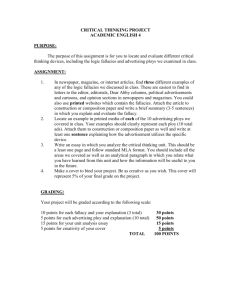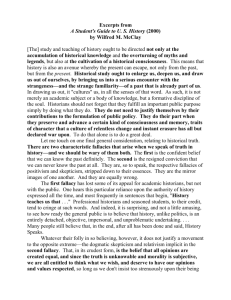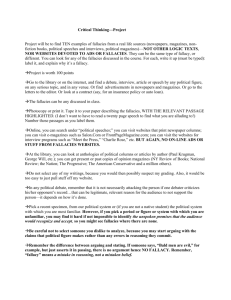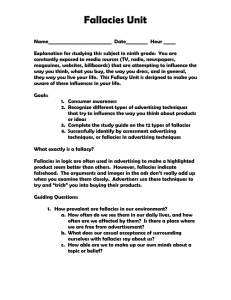Logical Fallacies, Formal and Informal
advertisement
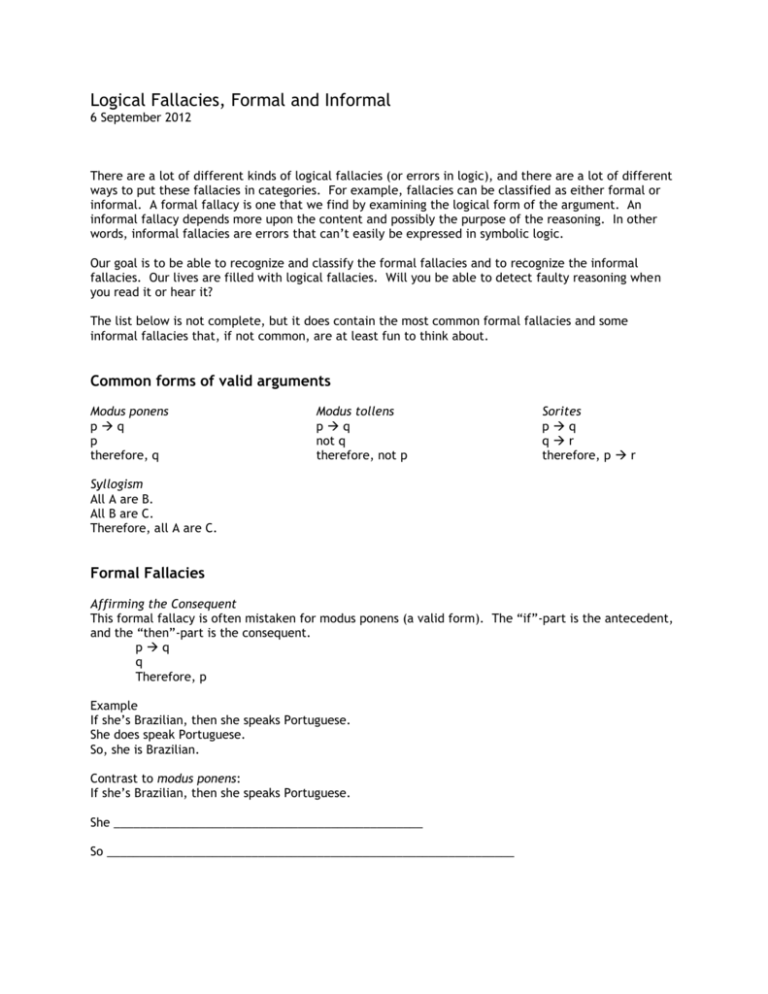
Logical Fallacies, Formal and Informal 6 September 2012 There are a lot of different kinds of logical fallacies (or errors in logic), and there are a lot of different ways to put these fallacies in categories. For example, fallacies can be classified as either formal or informal. A formal fallacy is one that we find by examining the logical form of the argument. An informal fallacy depends more upon the content and possibly the purpose of the reasoning. In other words, informal fallacies are errors that can’t easily be expressed in symbolic logic. Our goal is to be able to recognize and classify the formal fallacies and to recognize the informal fallacies. Our lives are filled with logical fallacies. Will you be able to detect faulty reasoning when you read it or hear it? The list below is not complete, but it does contain the most common formal fallacies and some informal fallacies that, if not common, are at least fun to think about. Common forms of valid arguments Modus ponens pq p therefore, q Modus tollens pq not q therefore, not p Sorites pq qr therefore, p r Syllogism All A are B. All B are C. Therefore, all A are C. Formal Fallacies Affirming the Consequent This formal fallacy is often mistaken for modus ponens (a valid form). The “if”-part is the antecedent, and the “then”-part is the consequent. pq q Therefore, p Example If she’s Brazilian, then she speaks Portuguese. She does speak Portuguese. So, she is Brazilian. Contrast to modus ponens: If she’s Brazilian, then she speaks Portuguese. She _______________________________________________ So ______________________________________________________________ Denying the Antecedent This formal fallacy is often mistaken for modus tollens (a valid form). pq Not p Therefore, not q. Example If she were Brazilian, then she would know that Brazil’s official language is Portuguese. She isn’t Brazilian; she’s from London. So, she surely doesn’t know Brazil’s language official language is Portuguese. Contrast to modus tollens: If she were Brazilian, then she would know that Brazil’s official language is Portuguese. She ______________________________________________________________________ So _______________________________________________________________________ Converting a Conditional pq Therefore, q p Example If Bill was President of the U.S., then he was over 35. Therefore, if Bill was over 35, then he was President. Contrast to the contrapositive: If Bill was President of the U.S., then he was over 35. If ___________________________________________________________________ Undistributed Middle Failing to distribute the middle term over at least one of the other terms is the fallacy of undistributed middle. All A are B. All C are B. Therefore, All A are C. Example All collies are animals. All dogs are animals. Therefore, all collies are dogs. How do we fix this? All collies are _____________________. All dogs are ____________________________. All collies are animals. Informal Fallacies This is a very small sample of different types of informal fallacies. Questionable Premise (Lying) This occurs when someone intentionally says something that is known to be false in an argument’s premise. Abraham Lincoln, Theodore Roosevelt, and John Kennedy were assassinated. They were U.S. presidents. Therefore, at least three U.S. presidents have been assassinated. Red Herring A red herring is a smelly fish that was used to train bloodhounds. It is also a digression that attempts to leads someone off the track. Senator Jones says that we must let the banks fail for their bad practices, but in tough economic times we need to support our President. Line-Drawing If we improperly reject a vague claim because it is not as precise as we’d like, then we are using the line-drawing fallacy. Also called the Bald Man Fallacy because of the following famous example: Dwayne can never grow bald. Dwayne isn’t bald now. Don’t you agree that if he loses one hair, that won’t make him go from not bald to bald? And if he loses one hair after that, then this one loss, too, won’t make him go from not bald to bald. Therefore, no matter how much hair he loses, he can’t become bald. Straw Man This occurs when someone attributes an easily refuted position to the opponent (and a position that the opponent wouldn’t actually agree with), and then proceeds to attack the easily refuted position (the straw man). Senator Jones says that we should not fund the attack submarine program. I disagree entirely. I can't understand why he wants to leave us defenseless like that. Post hoc, Ergo Propter Hoc (“After this, therefore because of this”) This fallacy occurs when someone notices that event A is followed in time event B, and then hastily leaps to the conclusion that A caused B. It is a type of “false cause” fallacy. I ate in that Ethiopian restaurant three days ago and now I’ve just gotten food poisoning. The only other time I’ve eaten in an Ethiopian restaurant I also got food poisoning, but that time I got sick a week later. My eating in those kinds of restaurants is causing my food poisoning. Cum Hoc, Ergo Propter Hoc (“With this, therefore because of this”) This is a false cause fallacy that doesn’t depend on time (as the post hoc, ergo propter hoc fallacy above). Gypsies live near our low-yield cornfields. So, gypsies are causing the low yield. Begging the Question (Circular Reasoning) This occurs when the conclusion is derived from premises that already assume the conclusion is true. The Bullfighters Association president said, “Women shouldn’t fight bulls because a bullfighter is and should be a man.” Equivocation This occurs when we use two different meanings of the same word. The sign said "fine for parking here", and since it was fine, I parked there. Appeal to False or Misleading Authority This occurs when someone uses an authority to make their claim, but the authority isn’t really an authority or is an authority on another topic completely. “I’m not a doctor, but I play a doctor on TV, and I wouldn’t dream of using anything but Tylenol for my toughest headaches.” 1. Identify the following as either valid or invalid. If possible, identify the form. Lewis Carroll, in Through the Looking Glass: “You couldn’t have [jam] if you did want it,” the Queen said. “The rule is jam tomorrow and jam yesterday — but never jam today.” “It must sometimes come to jam today,” Alice objected. “No it can’t,” said the Queen. “It’s jam every other day: today isn’t any other day, you know.” Sir Arthur Conan Doyle (Sherlock Holmes) in The Hounds of the Baskervilles: If a man's forefinger is stained yellow, then the man rolls his own tobacco. Mortimer's forefinger is heavily stained with yellow. Therefore, we can conclude that Mortimer rolls his own tobacco. If it’s raining, then the streets are wet. It’s raining. Therefore, the streets are wet. If it’s raining then the streets are wet. The streets are wet. Therefore, it’s raining. If it’s raining, then the streets are wet. It isn’t raining. Therefore, the streets aren’t wet. Ladies and gentlemen of the jury, look at the bloody clothes, the murder weapon. Imagine the helpless screams of the victim. Such a crime deserves no verdict except guilty, guilty! There are more laws on the books than ever before, and more crimes are being committed than ever before. Therefore, to reduce crime, we must eliminate the laws. We should pass a constitutional amendment making it illegal to burn the American flag. Anyone who thinks otherwise just hates America. Poetry is a based on rhythm, and music is based on rhythm, so poetry is music. The Soviet Union collapsed after taking up atheism. Therefore, we must avoid atheism for the same reasons. Most heroin users started out smoking pot. If you start smoking pot, you’ll end up a heroin user, too. Really exciting novels are very rare. And since rare books are expensive, I can’t afford to buy any really exciting novels. Ms. Hood says that feeding squirrels is dangerous and increases rabies on campus. Therefore, we should all stop feeding the squirrels. From Big Bang Theory (approximately, after the guys come home from the North Pole) Sheldon’s Mom: “See, Shelly! I prayed for you to be safe, and you came home safe. You need to believe in God.” 2. Write your own examples of logical fallacies. Try to write one for each type of fallacy listed on the handout. 3. Optional: Can you find examples of logical fallacies in advertising? It’s easier than you think.


